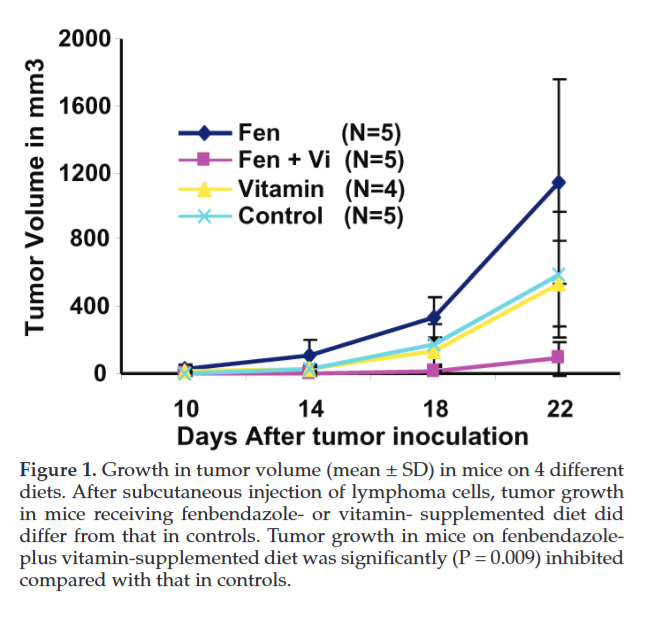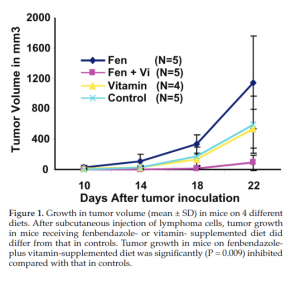
Comment:
This is a study that is often cited by people who advocate for fenbendazole in cancer treatment, however it doesn’t take much looking to see that not only does it not support it’s use, but there are clear potential danger signals.
First, this is a mouse study with a total of 19 mice across 4 group – that’s an incredibly small number.
Most importantly , as the graph shows, although the combined fenbendazole and vitamin group had slower tumor growth, the fenbendazole group itself had increased tumor growth (although not statistically significant). So based on this, we are to believe that the combination of fenbendazole with a minor amount of dietary vitamin supplementation is effective against cancer, while fenbendazole itself with a lesser amount of vitamins is ineffective or possible makes tumor growth accelerate.
And even if that was the case, are we confident that we know what vitamin supplement to give a human along with fenbendazole to make sure we are on the positive side, rather than the negative?

Summary:
This is an analysis of a pre-clinical animal study, not a human trial. Its findings are hypothesis-generating and cannot be directly applied to clinical practice.
Clinical Bottom Line
This study in mice found that the combination of the anti-parasitic drug fenbendazole and supplementary vitamins significantly inhibited the growth of a human lymphoma xenograft. In contrast, neither fenbendazole alone nor vitamins alone had a statistically significant effect on tumor growth compared to a standard diet.
Notably, the group receiving fenbendazole alone showed a non-significant trend toward increased tumor volume. The authors suggest this was likely due to a single outlier animal with a large tumor and may represent experimental noise rather than a true biological effect.
Results in Context
The primary outcome measured was tumor volume in SCID mice after subcutaneous injection of human lymphoma cells.
-
Fenbendazole + Vitamins Group: This group showed a significant inhibition of tumor growth compared to the control group ().
-
Vitamins Alone Group: Tumor growth was not significantly different from the control group ().
-
Fenbendazole Alone Group: This group did not show a statistically significant difference in tumor growth compared to the control group (). However, as seen in Figure 1, the mean tumor volume in this group was the largest of all four groups at the end of the experiment. The authors attribute this trend toward increased tumor size to a single outlier mouse and state that further studies would be needed to determine if fenbendazole has any tumor-promoting effects in this model.
Assertive Critical Appraisal
-
Animal Model: These findings are from a study using immunocompromised mice with an implanted human lymphoma cell line (a xenograft model). Results from such models often do not translate to human patients, as they cannot replicate the complexity of the human immune system and tumor microenvironment.
-
Very Small Sample Size: The study involved only 5 mice per group (one group ended with 4). This small size makes the results highly susceptible to being skewed by individual outliers, a limitation the authors acknowledge when explaining the apparent tumor growth in the fenbendazole-only group.
-
Dietary Uncertainty: The researchers hypothesize that the results in their controlled study were less dramatic than their initial observation because the custom diet was near its 6-month expiration date, potentially containing lower vitamin concentrations. This was not confirmed with a direct analysis of the feed.
Research Objective
The study’s objective was to conduct a controlled experiment to determine whether fenbendazole, supplementary vitamins, or the combination of both affected the growth of a human lymphoma cell line in SCID mice. This was prompted by an initial observation where these xenografts failed to grow in mice receiving a fenbendazole-and-vitamin-supplemented diet during a facility-wide pinworm treatment.
Study Design
This was a controlled, experimental animal study. Twenty 4-week-old male SCID mice were randomly assigned to four diet groups (n=5 per group):
-
Control (standard diet)
-
Fenbendazole only (standard diet + 150 ppm fenbendazole)
-
Vitamins only (standard diet with supplemented vitamins)
-
Fenbendazole + Vitamins (standard diet with supplemented vitamins + 150 ppm fenbendazole)
The mice were fed these diets for two weeks before being implanted with lymphoma cells. Tumor volume was measured every four days.
Bibliographic Data
-
Title: Unexpected Antitumorigenic Effect of Fenbendazole when Combined with Supplementary Vitamins
-
Authors: Ping Gao, Chi V Dang, and Julie Watson
-
Journal: Journal of the American Association for Laboratory Animal Science
-
Year: 2008
-
DOI: Not available in the document.
This AI-generated analysis is for informational and research purposes only and is not a substitute for professional medical advice, diagnosis, or treatment. Always seek the advice of a qualified health provider with any questions you may have regarding a medical condition.
Original Article:
Full text pdf: Unexpected Antitumorigenic Effect of Fenbendazole when Combined with Supplementary Vitamins
